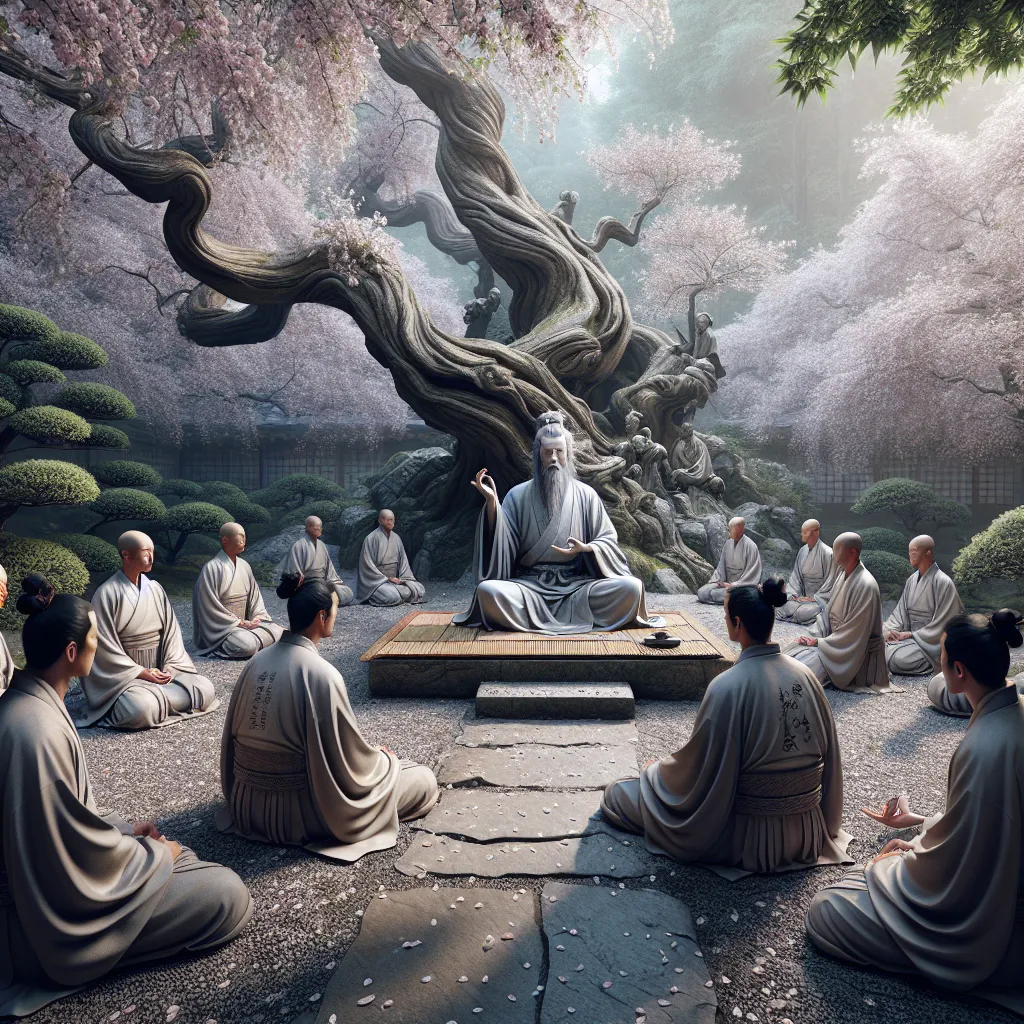
- Published on
- Authors

- Name
- You
The Role of the Zen Master: Guiding Students on the Path
Introduction
Zen Buddhism represents more than a spiritual tradition; it's a profound journey into the depths of consciousness and being. Central to this journey is the Zen master, or Roshi, whose role is pivotal in guiding students toward enlightenment. This article delves into the dual functions of the Zen master as a spiritual guide and teacher, blending the rigors of advanced science with the timeless wisdom of Zen practices.
The Zen Master: A Historical Perspective
Historically, Zen masters have been revered for their profound wisdom and ability to transmit esoteric knowledge. The term "Roshi" itself connotes an elder master who embodies the essence of Zen. The legacy of renowned Zen masters like Dogen, Hakuin, and Thich Nhat Hanh illustrates this deep tradition of spiritual mastery and pedagogical prowess.
| Zen Master | Era | Contribution |
|---|---|---|
| Dogen | 1200s | Founded Soto school, authored "Shobogenzo" |
| Hakuin | 1600s | Revitalized Rinzai school, known for teaching Koans |
| Thich Nhat Hanh | 1900s | Global peace activist, introduced mindfulness |
Scientific Insights into the Zen Master's Role
Neuroscientific research reveals fascinating insights into the impact of Zen practices. Studies show that consistent practice under a master's guidance enhances neuroplasticity, fostering profound changes in brain structure and function. This section explores how brainwaves, specifically theta and gamma waves, are influenced by Zen meditation, promoting heightened states of awareness.
Neuroplasticity and Mindfulness
- Theta Waves: Deep meditation synchronizes these brainwaves, linked with memory and relaxation.
- Gamma Waves: High-frequency brainwaves associated with heightened perception and cognitive function.
Pedagogical Techniques of Zen Masters
Zen masters employ various teaching methods to guide their students. These techniques are versatile, often tailored to individual needs, emphasizing direct experience over theoretical knowledge.
Koans:
- Paradoxical anecdotes or riddles used to provoke deep thought and enlightenment.
- Example: "What is the sound of one hand clapping?"
Shikantaza:
- Translated as "just sitting," this form of meditation focuses on being completely present.
- Encourages a state of objectless awareness.
Direct Interaction:
- One-on-one encounters where the master addresses the student's specific spiritual challenges.
- Uses non-verbal cues and intuitive responses to foster understanding.
Mystical Wisdom: Zen Teachings and Enlightenment
Zen teachings emphasize living fully in the present moment. The wisdom distilled from centuries of practice is simple yet profound, merging with modern scientific understanding to create a holistic approach to spiritual growth.
- Satori (Enlightenment): Defined as sudden enlightenment, it's often the goal of Zen practice, achieved through rigorous discipline and the guidance of a Roshi.
Conclusion
The Zen master's role is not merely that of a teacher but a living embodiment of Zen principles. Through a combination of historical insight, scientific exploration, and mystical wisdom, we can appreciate the multifaceted approach Zen masters take to guide their students on the path to enlightenment.
The interplay of science and spirituality in understanding the Zen master's influence underscores a timeless truth: the Roshi's guidance is as much about cultivating the inner landscapes of the mind as it is about navigating the external world.
Further Reading
Books:
- "Zen Mind, Beginner's Mind" by Shunryu Suzuki
- "The Heart of the Buddha's Teaching" by Thich Nhat Hanh
Articles:
- "Neuroscience of Zen Meditation" - Journal of Contemplative Studies
- "The Role of Koans in Zen Practice" - Zen Philosophy Quarterly
By merging ancient wisdom with modern scientific understanding, we appreciate the invaluable role of the Zen master in guiding seekers on their spiritual journey.
